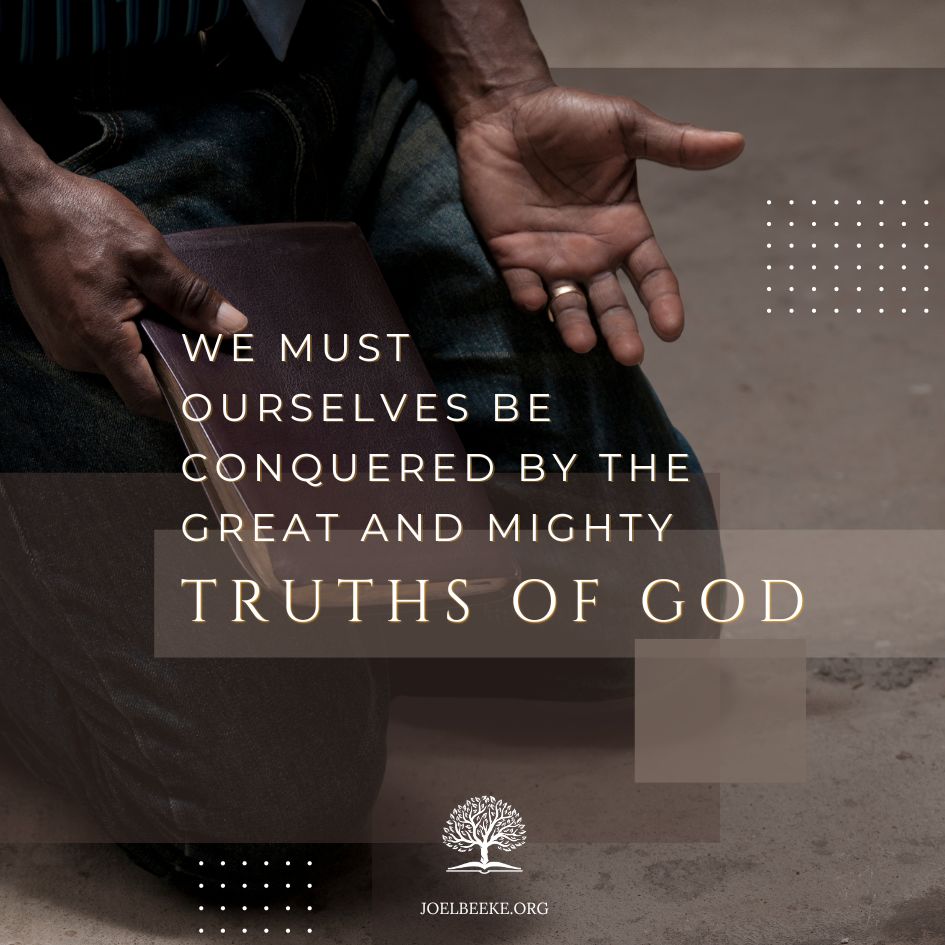
Finally, the Puritans saturated all their evangelistic efforts in prayer. They were “men of the closet” first of all. They were great preachers only because they were also great petitioners who wrestled with God for divine blessing upon their preaching. Richard Baxter said, “Prayer must carry on our work as well as preaching; he preacheth not heartily to his people, that prayeth not earnestly for them. If we prevail not with God to give them faith and repentance, we shall never prevail with them to believe and repent.”1The Reformed Pastor, p. 123. And Robert Traill wrote, “Some ministers of meaner gifts and parts are more successful than some that are far above them in abilities; not because they preach better, so much as because they pray more. Many good sermons are lost for lack of much prayer in study.”2Works of Robert Traill, 1:246.
The well-known story of Puritan-minded Robert Murray M‘Cheyne illustrates best what Traill means. An old sexton in M‘Cheyne’s church noticed the awe on the face of a visitor and invited him into his study. “Tell me,” said the visitor, “having sat under this godly man’s ministry, what is the secret of his success?”
The sexton told the visitor to sit at M‘Cheyne’s desk. Then he asked the man to put his hands on the desk. Then to put his face in his hands and weep. Next the two men walked into the church sanctuary and ascended to the pulpit. “Lean over the pulpit,” the sexton said. “Now stretch out your hands and weep.” “Now you know the secret of M‘Cheyne’s ministry.”3Cf. John Flavel, “The Character of a True Evangelical Pastor,” in Works of Flavel, 6:564-85.
The church today desperately needs such preachers whose private prayers season their pulpit messages. The Puritan pastors jealously guarded their personal devotional time. They set their priorities on spiritual, eternal realities. They knew that if they ceased to watch and pray constantly they would be courting spiritual disaster. Faithful, steadfast, and sincere, they were God-fearing men who continually examined themselves and were painfully aware, as John Flavel said, “that a man may be objectively a spiritual [man], and all the while subjectively a carnal man.”4Ibid., p. 568. They believed, as John Owen noted: “No man preacheth that sermon well that doth not first preach it to his own heart…. If the word do not dwell with power in us, it will not pass with power from us.”5Works, 9:455, 16:76. Unlike many modern evangelists, the quality of their spiritual life was uniformly high.6See Benjamin Brook, The Lives of the Puritans, 3 vols. (1813; reprint Pittsburgh: Soli Deo Gloria, 1994); Joel R. Beeke and Randall J. Pederson, Meet the Puritans (Grand Rapids: Reformation Heritage Books, 2006); William Barker, Puritan Profiles (Fearn, Ross-shire: Christian Focus, 1996).
Concluding Application
Let us seriously ask ourselves: Are we, like the Puritans, thirsting to glorify the triune God? Are we motivated by biblical truth and biblical fire? Do we share the Puritan view of the vital necessity of conversion? It is not enough just to read the Puritans. A stirring of interest in the Puritans is not the same thing as a revival of Puritanism. We need the inward disposition of the Puritans toward evangelism. We need in our hearts, lives, and churches the authentic, biblical, intelligent piety the Puritans showed.
Let us challenge one another! Who among us will live godly in Christ Jesus like the Puritans? Who will go beyond studying their writings, discussing their ideas, recalling their achievements, and berating their failures? Who will practice the degree of obedience to God’s Word for which they strove? Will we serve God as they served Him? “Thus saith the LORD, Stand ye in the ways, and see, and ask for the old paths, where is the good way, and walk therein, and ye shall find rest for your souls” (Jer. 6:16).
We must ourselves be conquered by the great and mighty truths of God. The time is short. Soon we shall pray our last prayer, read Scripture for the last time, preach our last sermon, and witness to our last friend. Then the only thing that will matter will be the gospel. Surely on our deathbed a question uppermost in our minds will be: What kind of an evangelist have I been? Scripture tells us: “He that winneth souls is wise” (Prov. 11:30). “And they that be wise shall shine as the brightness of the firmament; and they that turn many to righteousness as the stars for ever and ever” (Dan. 12:3).
Excerpt from
Puritan Evangelism: A Biblical Approach
Joel R. Beeke








